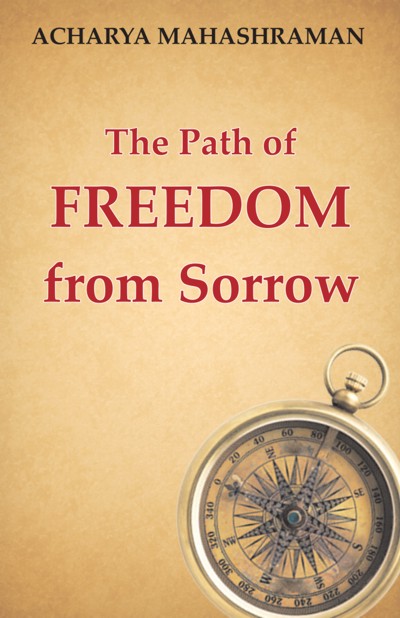The greatest achievement in life is uninterrupted bliss for an individual. A man goes through many situations. Sometimes it may be an extremely adverse situation and sometimes it may be most favourable situation. The one, who practices equanimity in both the situations, can attain uninterrupted peace or natural bliss. Though there are some hurdles which interrupt our bliss.
1. Anxiety
The first hurdle is anxiety. It is said that a funeral pyre burns the dead body while anxiety bums the living man. Anxiety decays ones physical strength. As it is said in Sanskrit:
Chintaya nashyate rupam, chintaya nashyate balatn Chintaya nashyate gyanam, vyadhirbhavati chintaya.
It means 'anxiety destroys beauty, strength and knowledge and causes diseases'.
The person, who thinks unnecessary and generates anxiety within themselves, can never make great achievements in his life. After World War II, Mr. Churchill was said to work over eighteen hours a day. Someone eventually asked him - 'How can you execute so much of your work efficiently over such a long period of time? Do you not get anxiety for the work?' With a smile Churchill replied - "I do not find time to feel anxiety." Problems will come into our lives. If our thoughts are positive, then problems can be fixed perfectly. The situation may be complicated but that does not mean your thought process has to be. Keep your mind at peace. If your mind is at peace and joyful then problems can be sorted out easily. Acharya Tulsi delivered a beautiful phrase - Don't worry but think. We ought to make our thoughts healthy and positive.
Once, a king visited a saint and requested - "Please, give me any mantra to feel happiness, joy and uninterrupted peace in my life." The saint gave him a small phrase said - 'This moment will also pass away.' This small phrase changed the direction of the life of the king.
No incident in and of itself causes pain. Pain is the causal effect of mental weakness. A weak mind magnifies small incident and makes mountains out of molehill. Whereas if the mind is strong then giant sized problems would seem as small as tiny molehill. Anxiety weakens the mind. As it is said in Sanskrit literature:
Chinte! Durbalatasti kim tav sakhi yatsardha-mevekshyate Naivam kintu mamasti viśhvavijayi dukhabhigho nandanah
Tasyaisha ramaniiti vallabhatara jata madiya snusha Shvashru-bhakti-parayanan-vahamato no yati duram kvachit
i.e. O worry! Is weakness your friend? It seems to be always
with you. Then "worry" replied- 'No, but I have a world-
winner son. His name is "pain". "Weakness" is his loving wife
and of course, therefore, my daughter-in-law. She is keenly
dedicated to her mother-in-law. Therefore, weakness does
never take my leave.'
We should empower our mind. The one who has positive thinking and always keeps this phrase in mind "This moment will also pass away' can attain everlasting peace of mind.
2. Sexual Desire
The second hurdle in bliss is -sexual desire. An erotic person can never feel continuous joy in the life. Lust makes the person unstable. Though sexual desire is not expressed outwardly, if it is at the mental level then also it causes pain. Physically a person may appear free from sexual desires but his internal feelings can keep him unsettled. It is mentioned inagam:
Sallam kama visam kama, katna asivisovama Kame patthemana, akama janti doggaim
Sexual desire is like a throne, poison and ashivish (a species of snake) snake. A person craving for lust stirs his downfall even if his physical urges are not satisfied.
Once there was a hermit living in his monastic place. He accepted the ascetic life at a very young age. The path of spiritual detachment is opened after becoming a monk by practicing control of mind and conquering his sexual desires. The main thing is the goal should be clear. How can a purposeless man reach any destination full of purpose? After deciding on the goal, there must be right endeavour in that direction. Perhaps, a purposeful goal was not very clear to the monk. A little amount of the goal was known to him, but the perfect endeavour was not directed in that direction. He had a constant desire for sex. Neither would he study the spiritual literature nor would he practice Meditation or chanting. He had become almost a gregarious personality. Since he was an ascetic, he could not enjoy the sexual life freely. There was a young couple living in front of his residence. Seeing the couple the monk thought that he had made a great mistake by becoming a monk. "This couple is very lucky", he thought. "They are living a better human life. They are enjoying the sexual pleasure." The monk, in spite of being free from physical erotic pleasure, mentally he was praying for this desire. On the other hand, whenever the couple would see to the monk, they would comment to each other, "the monk is very fortunate. We are living a life of non-restraint whereas he is living a restraint life. The moment will be fortunate for us when we also renounce the world."
The couple was praying for the life of restraint though they were living a lay-life. The monk, in his next life, was born in a lower place whereas the couple wound up in heaven. Materialistic goods are necessary for survival. One requires eating and drinking. However, consumption of materialistic objects and control over the senses should go parallel. In spite of making use of the senses and materialistic things, man can remain free from erotic impulses and attachment.
3. Absence of Equanimity
The third hurdle in experiencing bliss is -the absence of equanimity. Equanimity means to be free from attachment and aversion or to endure the favourable and unfavourable situations with calmness. Of course, unfavourable situations are hard to bear but sometimes favourable situations may also become hard to bear.
Enduring adversity should be done willingly not by force. In the absence of equanimity, adversity makes the person mournful and miserable and favourable situations -conversely, makes him happy.
It is mentioned in Ayaro that 'etthampi aggahe chare'. The principle of denial saves us from reaction. We should not accept everything. Our mind is not a trash bin. It is a temple of God. Therefore, we must practice to stay away from mindless reactions, practice actions with awareness, and live in the present moment. A person, who lives with equanimity and straightness, can experience a constant peace of mind.
King Shrenik, once, visited Mahatma Buddha. A few Buddhist monks were sitting close to him. King Shrenik also sat in his presence. He saw the monks were very happy. It's like joy and bliss was flowing from their faces.
A person, who is truly spiritual, experiences bliss without restriction. As it is said in Parmeshthi Vandana by Gurudev Tulsi
sada labh alabh me, sukh dukh me madhyasth hai shantimay vairagyamay, anandmaya atmastha hai vasana se virat akriti sahaj param prasanna hai sadhna dhan sadhu antarbhav me asanna hai.
i.e. A monk who is balanced in gain and loss, indifferent and equanimous in pain and pleasure; lives the life of peace, detachment and natural bliss and who is free from lust remains joyful. Sadhana is the only asset for him. Such a monk lives in his inner world..
King Shrenik also observed, 'The life of these monks is full of hardships. Sometimes they get desirable and plenty of food and sometimes they get nothing. They live with austerity. Yet how happy their faces are! My princes, who have almost all the comforts, appear mournful, sad, and disappointed.' What could be the reason? He asked Buddha. Mahatma Buddha replied, 'King! My monks have contentment, equanimity and straightness. They are satisfied with what they get. They do not worry about what they would get tomorrow in alms. They know how to live in the present - at ease in the moment. Your sons are showered with luxuries. But they are not content. They do not practice equanimity. If one who is busy either in past memory or future imagination, how come he experiences bliss? The man, living the life of dissatisfaction and ambitions, can never feel blissful in spite of having all the material comforts of life. The person who has equanimity and straightness will achieve an uninterrupted peace of mind.
 Acharya Mahashraman
Acharya Mahashraman
